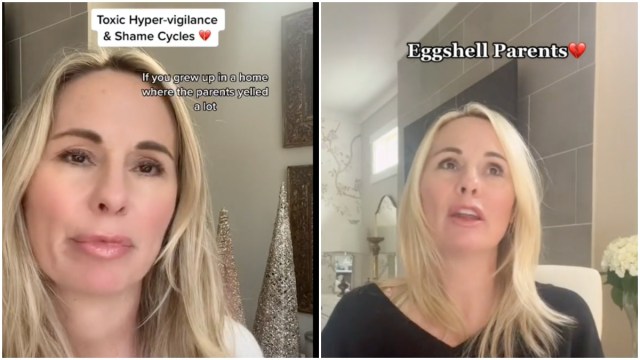A licensed clinical psychologist on TikTok explains what “eggshell parenting” is and why you should strive to avoid it
All kids deserve a home where they feel safe, loved, and secure—where they know that no matter what happens, they’ll always have a safe harbor to return to. But sadly, that’s not what all kids have. One clinical psychologist is shining a light on a common “parenting style” that’s pretty much the exact opposite of this: she calls it “eggshell parenting.”
Dr. Kim Sage went viral on TikTok for describing this parenting style, which she says makes kids feel as though they’re “walking on eggshells” because their parents’ moods are unstable and unpredictable.
@drkimsage Eggshell parenting and emotionally unpredictable, unsafe parenting often creates a lifetime of hypervigilance in us —and a deep belief that there’s no such thing as real safety in relationships.💔#eggshellparent #toxicparent #walkingoneggshells #emotionallyimmatureparents #narcissisticparent #drkimsage
♬ original sound – dr kim🦋psychologist
Eggshell parenting is “a way of putting your child in a position where they have to always be hyper-vigilant to what may or may not happen next,” she explained. “Even if you’re loving and safe and wonderful, if it follows that you can be unsafe at the core, you are not safe.”
The result is kids who constantly feel insecure, cautious, and afraid of making the wrong move—like they’re walking on eggshells so they don’t set off their parents.
In her video, Sage gives this example: “The parent’s mood is like being on a roller coaster. You never know what to expect, but there’s always going to be significant high highs and low lows. Basically, emotionally, you never know what to expect, but you have to prepare for the part where it’s not safe.”
@drkimsage Eggshell parents& trauma💔#trauma #hypervigilance #eggshellparent #empath #drkimsage
♬ Claire de Lune – Ave Maria
Sage has gone on to make tons of other videos about eggshell parenting—both for people who are parents now and for people who may have grown up with these types of parents. She explains how to identify eggshell parenting (hint: if you’re reading this and wondering if you’re an eggshell parent, your self-awareness is already high enough that you’re probably not), and gives people tips on how to break the eggshell cycle.
If you were raised by eggshell parents, she says, it will likely take some active work to make sure those patterns don’t emerge as you raise your own kids. The first steps to take: work on regulating your own emotions so they aren’t changing on a dime. Then, take responsibility for your own actions and apologize to your kids if a sudden emotional switch or outburst left them reeling.
